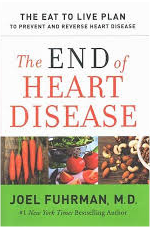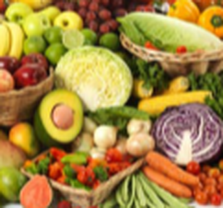
I first met Dr Fuhrman about a dozen years ago at a conference and found his concept of maximizing "nutrient density" while minimizing "caloric density" (which he expresses in the equation: Health = Nutrients/Calories) so sensible and easy to understand, that I went right out and bought his book, Eat to Live. For years Eat to Live was my "go to" reference for providing people interested in maximizing their health a framework they could easily use for making sense the growing body of nutritional science. Although I have read additional books by Dr Fuhrman in the years since, none of them had surpassed Eat to Live -- until now. With coronary artery disease our nation's number one killer (and that has definitely been the case in my own extended family) The End of Heart Disease joins a growing cadre of evidence -based books offering something much better than the conventional risky surgeries and drugs with horrific side effects that are draining our health care system, while doing little to actually stop progression of this fatal disease. Although Dr. Caldwell Esselstyn's book, Prevent and Reverse Heart Disease is excellent too, and his approach has certainly saved and enriched many lives, The End of Heart Disease has some additional and wonderful contributions to make. Esselstyn (and Pritikin and Ornish too) all demonstrated reversal of blocked arteries using a very low fat (10% of calories from fat) diet. While this diet unquestionably improved many lives (as shown in the fabulous documentary, Forks Over Knives) over time some people appear to not do so well on such a low fat diet -- but I was not aware of any research demonstrating reversal of blockages using a diet that included nuts and seeds -- until now. While all these doctors are still in agreement that oils (including like olive, and coconut have no place in diet to reverse coronary artery disease, Fuhrman presents evidence that with oils being excluded, and building the diet on whole unprocessed plant foods, the addition of nuts and seeds makes a profound contribution -- as long as they are not eaten in amounts that cause overconsumption of calories. I personally know someone who wanted to reverse his heart disease using diet, but was slender and not a big eater, who couldn't stay on Esselstyn's diet, because he was losing too much weight and simply could not eat enough to stay satiated, energetic and maintain his weight, without the addition of something more calorically dense, and had no idea that nuts and seeds would have provided this benefit, without damaging his arteries, and ended up going back to fish and chicken, and now remains on drugs.
One of the things I loved about this book, was the detailed explanations of vast amounts of published research --much of it I was not familiar with. For example in the section about IGF-1 and Heart Disease, he not only explains how those with the highest blood levels of this growth hormone have increased cardiovascular mortality (and consumption of animal protein is established to increase blood levels of this hormone) but then goes on to describe a 2014 study that added more clarity by comparing low glycemic high in animal protein (low-carb/high protein) with diets low in both refined carbs and animal protein. 6000 people followed for 18 years found a four fold increase in cancer mortality and 75% increase in all-cause mortality. Researchers further isolated the negative effects of high protein as being ONLY from animal protein, not plant protein.
Other sections of the book thoroughly explain popular headlines that have confused many about the contributions of meat, cheese and butter to heart disease, by showing reductions of specific biomarkers when these foods are substituted for refined carbohydrates. It turns out that BOTH refined carbs (like sugar and white flour) and animal foods are profoundly harmful -- and substituting one for the other can make certain markers improve -- but not a single study has demonstrated such changes can morbidity or mortality long term -- while the plant-based diets have.
Many other subjects are addressed in a similarly comprehensive and clear way and always well-referenced. For example he discusses salt and stroke risk, summarizes the pros and cons of various cardio protective diets, the impact of saturated fats on inflammation, the risks and overselling of statin drugs, to name just a few. In addition his dietary recommendations are thoroughly explained -- along with the justifications and the book includes a large section of recipes. Including the index, there are 430 pages -- a real bargain at $29.00 when you consider the cost of the book against just a single month's prescription of drugs that can probably be avoided by reading this book.
If you know someone motivated to avoid being cut open or placed on powerful drugs for the rest of their life, this is THE book to have them read!
One of the things I loved about this book, was the detailed explanations of vast amounts of published research --much of it I was not familiar with. For example in the section about IGF-1 and Heart Disease, he not only explains how those with the highest blood levels of this growth hormone have increased cardiovascular mortality (and consumption of animal protein is established to increase blood levels of this hormone) but then goes on to describe a 2014 study that added more clarity by comparing low glycemic high in animal protein (low-carb/high protein) with diets low in both refined carbs and animal protein. 6000 people followed for 18 years found a four fold increase in cancer mortality and 75% increase in all-cause mortality. Researchers further isolated the negative effects of high protein as being ONLY from animal protein, not plant protein.
Other sections of the book thoroughly explain popular headlines that have confused many about the contributions of meat, cheese and butter to heart disease, by showing reductions of specific biomarkers when these foods are substituted for refined carbohydrates. It turns out that BOTH refined carbs (like sugar and white flour) and animal foods are profoundly harmful -- and substituting one for the other can make certain markers improve -- but not a single study has demonstrated such changes can morbidity or mortality long term -- while the plant-based diets have.
Many other subjects are addressed in a similarly comprehensive and clear way and always well-referenced. For example he discusses salt and stroke risk, summarizes the pros and cons of various cardio protective diets, the impact of saturated fats on inflammation, the risks and overselling of statin drugs, to name just a few. In addition his dietary recommendations are thoroughly explained -- along with the justifications and the book includes a large section of recipes. Including the index, there are 430 pages -- a real bargain at $29.00 when you consider the cost of the book against just a single month's prescription of drugs that can probably be avoided by reading this book.
If you know someone motivated to avoid being cut open or placed on powerful drugs for the rest of their life, this is THE book to have them read!

